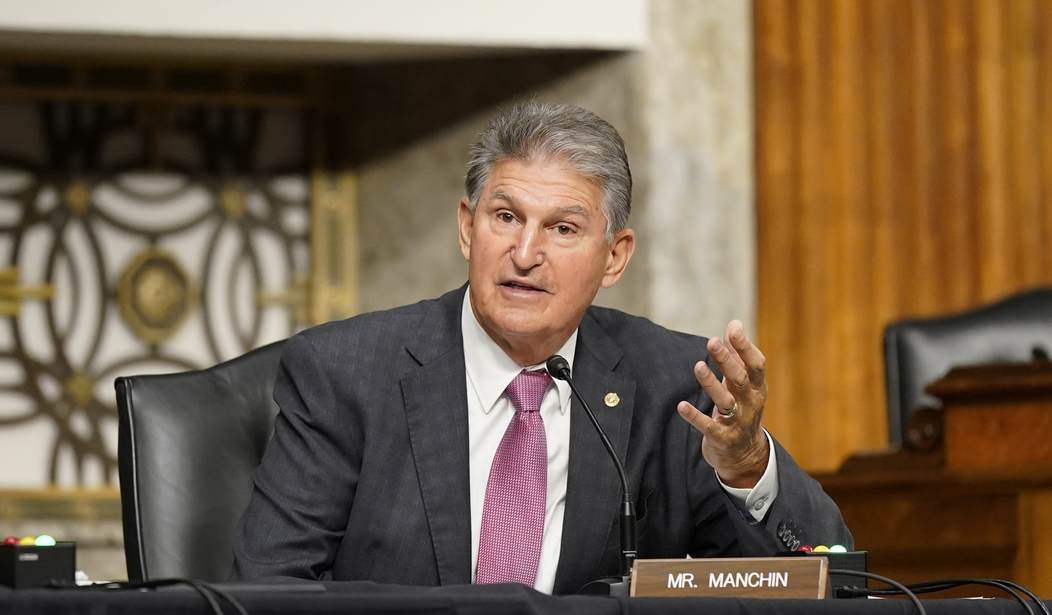On the day that the United States economy “officially” entered a recession, Sen. Joe Manchin (D-W.Va.) gave a boost to the Democrat’s midterm prospects by agreeing to support a $369 billion tax and climate package using the reconciliation process.
Despite Joe Biden’s amusing efforts to deny it, a recession is defined by two consecutive quarters of economic contraction. The numbers from the U.S. Bureau of Economic Analysis show the U.S. economy shrank by 0.9% in the second quarter on top of the 1.6% contraction in the first quarter. A strong job market notwithstanding, economic activity in the U.S. is slowing down — a direct result of deliberate policies by the Federal Reserve in raising interest rates rapidly — and painfully.
But the climate and tax bill will only tangentially affect the economy. The impact of the legislation is political. And the White House is ramping up a public relations/marketing campaign the likes of which may never have been seen before.
In truth, the $369 billion bill is but a whisper of the original $3.5 trillion Build Back Better bill envisioned by Democrats in 2021. That hardly matters as Democrats are desperately looking to stop the bleeding of support from key constituencies.
The plan, announced by the two Democrats on Wednesday evening, would generate an estimated $739 billion in revenue, spend $433 billion and reduce deficits by $300 billion over a decade. That’s still much smaller than the Biden administration’s plans before encountering Manchin’s repeated opposition.
Revenue would come from a 15% corporate minimum tax, allowing Medicare to negotiate drug-price cuts, and from boosting tax enforcement by increasing the Internal Revenue Service budget. The package would raise $14 billion from taxing carried interest, or profits made by some investment managers, at a higher rate.
The plain fact is that Majority Leader Chuck Schumer outmaneuvered Minority Leader Mitch McConnell with a rope-a-dope strategy. McConnell told Schumer he would block the $280 billion “CHIPS and Science Act,” which hands a $52 billion subsidy to the microchip industry, if Schumer went ahead with the climate and tax package, When Manchin backed away from the deal two weeks ago, McConnell allowed the CHIPS bill to proceed.
It’s not clear why Manchin now supports the climate and tax package. It appears that Schumer removed some elements Manchin objected to, including the state and local tax deduction, eliminated in the Trump tax cuts, but which Democrats in New York and New Jersey desperately want to add back for their rich contributors.
Manchin opposed expanding the state and local tax, or SALT, deduction that several House Democrats from New York and New Jersey have said is a priority. The deal also excludes a surtax on millionaires and tax on stock buybacks that Schumer was pushing for earlier in the month.
The agreement would provide $369 billion for “energy and climate change” according to a one-page summary. On the traditional-energy side, Manchin said Biden, Schumer and House Speaker Nancy Pelosi had agreed to advance permitting reforms that could benefit fossil fuel producers. On the other, the deal would include electric vehicle tax credits sought by automakers like Tesla and Toyota, including a credit for used vehicles for the first time.
Subsidies for Obamacare premiums would also be extended for three years.
Biden was going to give a national TV address tonight but decided against it. The reason is that the bill is not a done deal — yet. The Senate parliamentarian has to sign off on the bill, making sure that nothing in the legislation violates the Byrd rule’s narrow definition of what impacts the budget.
And before we forget about her, Sen. Krysten Sinema (D-Ariz.) has not come out in favor of the bill. In the past, she has opposed specific elements of the tax package. But it’s unlikely Sinema will stand in the way of the Democrats in their efforts to climb back into contention for the midterms.










Join the conversation as a VIP Member